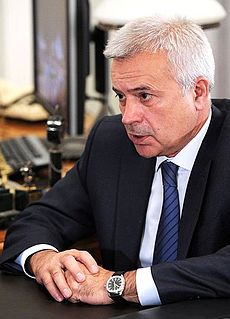A Quote by Vladimir Putin
Anyone who doesn't regret the passing of the Soviet Union has no heart. Anyone who wants it restored has no brains.
Related Quotes
This much I would say: Socialism has failed all over the world. In the eighties, I would hear every day that there is no inflation in the Soviet Union, there is no poverty in the Soviet Union, there is no unemployment in the Soviet Union. And now we find that, due to Socialism, there is no Soviet Union!
Back in 1956, we signed a treaty and surprisingly it was ratified both by the Supreme Soviet of the Soviet Union and the Japanese Parliament. But then Japan refused to implement it and after that the Soviet Union also, so to say, nullified all the agreements reached within the framework of the treaty.
The first year I was in office, only about 800 people came out of the Soviet Union, Jews. By the third year I was in office... second year, 1979, 51,000 came out of the Soviet Union. And every one of the human rights heroes - I'll use the word - who have come out of the Soviet Union, have said it was a turning point in their lives, and not only in the Soviet Union but also in places like Czechoslovakia and Hungary and Poland [they] saw this human rights policy of mine as being a great boost to the present democracy and freedom that they enjoy.
I don't think we replaced the Soviet Union with Al Qaida. I think we replaced, we should have, Soviet Union with the merger of globalization and the IT revolution. I think it's that. That is the real challenge that we face today. Unlike the Soviet Union, it has no face, it has no missiles, but it is something that challenges every job, every city and every community.
Why were the Europeans bothered about the Soviet Union at all? It was nothing to do with us. China had nothing to do with us. Why were we not building, without reference to the Soviet Union, a good society in our own countries? But no, we were all - in one way or another - obsessed with the bloody Soviet Union, which was a disaster. What people were supporting was failure. And continually justifying it.































